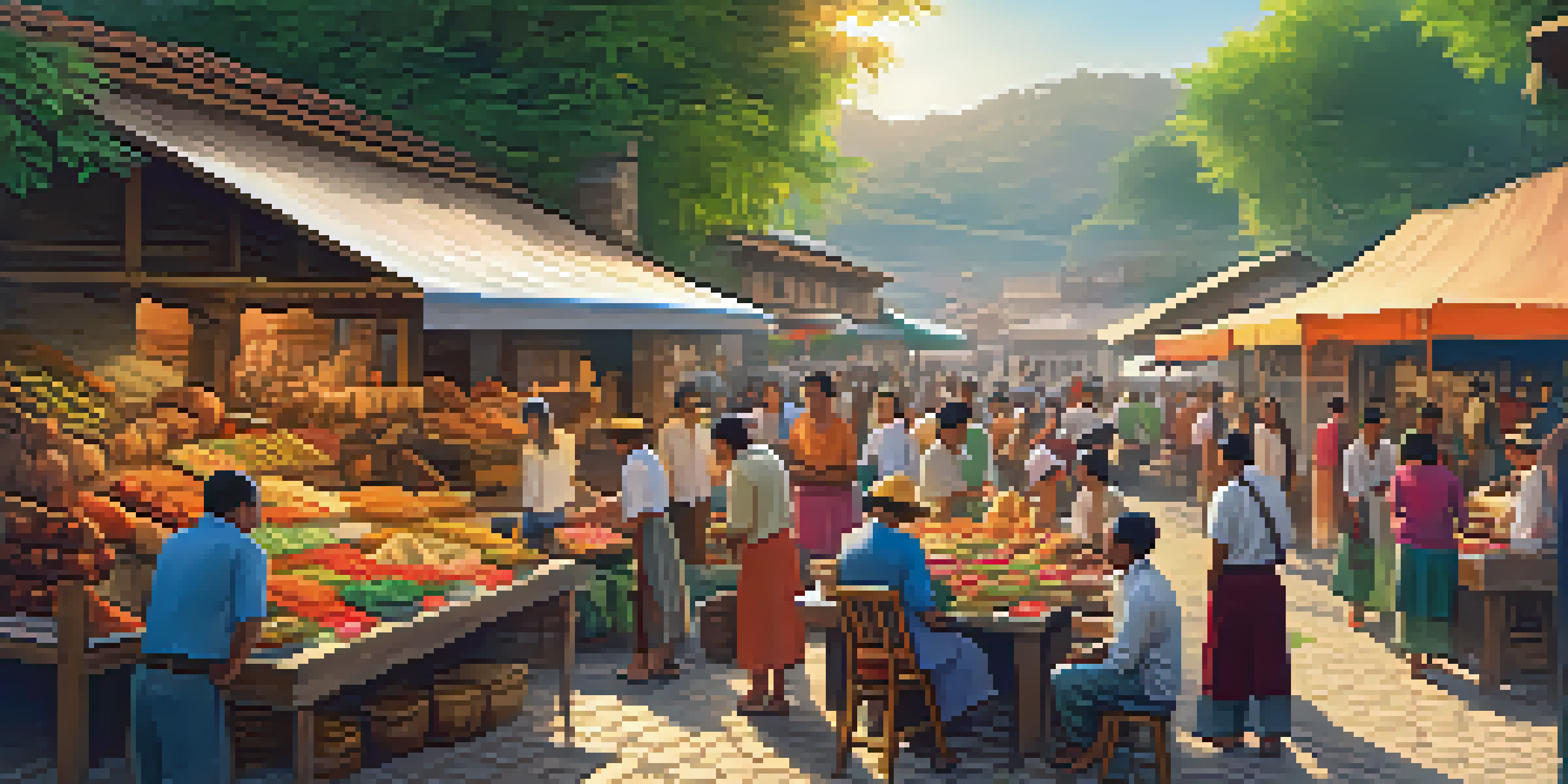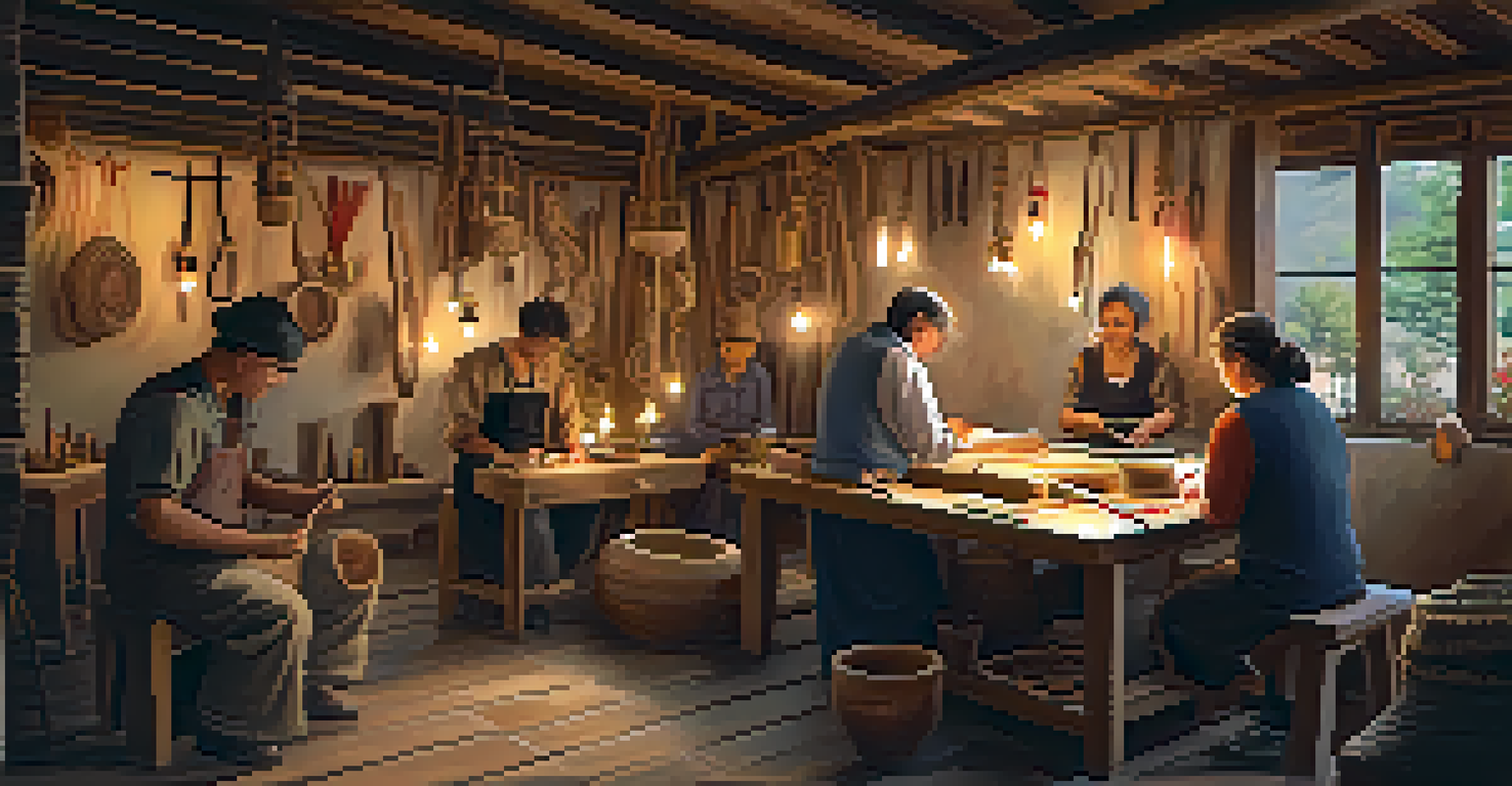Participatory Tourism: Engaging Locals in Tourism Development

Understanding Participatory Tourism and Its Importance
Participatory tourism is all about involving local communities in the tourism process. This approach not only enhances the visitor experience but also ensures that the benefits of tourism reach the people who live in these areas. Imagine a traveler not just visiting a destination but truly experiencing it through the eyes of a local.
The best way to find yourself is to lose yourself in the service of others.
When locals take part in tourism development, they can share their culture, stories, and traditions, enriching the travel experience. This creates a genuine connection between visitors and residents, allowing tourists to appreciate the authenticity of a place. Think of it as matching a recipe with the freshest ingredients, resulting in a delicious dish that everyone enjoys.
Moreover, participatory tourism helps in preserving local heritage and environment. When locals are engaged, they become stewards of their culture and surroundings, ensuring that tourism is sustainable and respectful. It’s like having a team of dedicated gardeners who protect and nurture their own beautiful garden.
Benefits of Engaging Locals in Tourism Development
Engaging locals in tourism development brings numerous benefits, not just for the community but also for travelers. One of the most significant advantages is economic empowerment, as locals can create businesses that cater to tourists, such as guided tours or local craft shops. This means that money spent by visitors stays within the community, contributing to local livelihoods.

Additionally, when locals are involved, tourism becomes more authentic. Travelers are increasingly seeking unique experiences that reflect local culture, and who better to provide that than the residents themselves? It’s much like going to a family gathering where you get to enjoy homemade dishes instead of a fast-food meal.
Local Engagement Enhances Tourism
Involving local communities in tourism development enriches visitor experiences and ensures that tourism benefits are felt by residents.
Furthermore, involving locals fosters a sense of pride in their culture and environment. When they see visitors appreciating their traditions, it boosts their confidence and encourages them to share even more. This cycle of appreciation creates a vibrant atmosphere that benefits everyone involved.
Challenges in Implementing Participatory Tourism
While participatory tourism has many benefits, there are also challenges that need to be addressed. One common issue is the lack of capacity or resources within local communities to effectively engage in tourism. Many residents might not have the knowledge or skills required to develop tourism initiatives, which can hinder their participation.
Traveling – it leaves you speechless, then turns you into a storyteller.
Moreover, there can be conflicts between tourism and local interests. Sometimes, tourism development may lead to over-commercialization, where the essence of local culture is lost. Picture a once-peaceful village that becomes overrun with souvenir shops and tour buses, diluting its charm.
Additionally, it’s essential to ensure that all voices within the community are heard. Sometimes, tourism planning can unintentionally favor certain groups over others, leading to inequalities. It’s vital to foster an inclusive environment where everyone feels valued and has the opportunity to contribute.
Successful Examples of Participatory Tourism
Several destinations around the world have successfully implemented participatory tourism, proving that it can be a powerful model. For example, in Thailand, the community-based tourism movement allows villagers to showcase their culture and traditions. Visitors can participate in activities like rice planting or cooking classes, leading to a more immersive experience.
Another great example is the 'living museums' in various regions where locals enact traditional crafts and skills. These initiatives not only provide visitors with an engaging experience but also help preserve these age-old practices. It’s similar to watching a live cooking show, where the chef shares tips and tricks, making the experience unforgettable.
Authenticity Drives Traveler Interest
Travelers increasingly seek authentic experiences that reflect local culture, which can only be provided by the residents themselves.
In South Africa, projects that involve locals in wildlife conservation have shown that community engagement can lead to successful tourism ventures. By allowing residents to participate in conservation efforts, they become invested in the well-being of their environment, which enhances both tourism and ecological sustainability.
Strategies for Engaging Locals in Tourism
To successfully engage locals in tourism development, it’s crucial to start with open communication. Hosting community meetings where residents can voice their ideas and concerns is a great way to build trust and collaboration. This approach is like brainstorming with a group of friends—everyone’s input can lead to creative and effective solutions.
Training and capacity-building programs are essential as well. Providing locals with the necessary skills, such as hospitality training or marketing techniques, can empower them to actively participate in tourism. Think of this as giving someone the right tools to build their dream home—without the tools, they may struggle to realize their vision.
Lastly, fostering partnerships between local communities and tourism stakeholders, like travel agencies and NGOs, is vital. These collaborations can create a support system that amplifies the voices of locals and ensures their involvement in decision-making. It’s much like forming a sports team where each player has a role, working together towards a common goal.
The Role of Technology in Participatory Tourism
Technology plays a significant role in enhancing participatory tourism by connecting locals with travelers. Platforms like social media allow residents to share their stories and experiences directly, creating a bridge between cultures. Imagine scrolling through a feed and discovering a local’s hidden gem that you would never find in a guidebook.
Moreover, mobile apps can facilitate interactions between locals and tourists, making it easier for visitors to book authentic experiences. These tools empower local entrepreneurs to promote their services and connect with travelers who are seeking unique adventures. It’s like having a personal concierge in your pocket, guiding you to the best local spots.
Technology Bridges Locals and Tourists
Technology facilitates connections between locals and travelers, allowing for the promotion of unique experiences and gathering valuable feedback.
Lastly, technology can also help gather feedback from tourists, which can be invaluable for local communities. Understanding what visitors appreciate can help locals tailor their offerings and improve the overall experience. This feedback loop is akin to a teacher adjusting their lesson plans based on student performance, leading to better outcomes for everyone.
Looking Ahead: The Future of Participatory Tourism
As the tourism industry continues to evolve, participatory tourism is likely to gain more traction. With a growing emphasis on sustainability and authentic experiences, travelers are increasingly looking for ways to connect with local communities. This trend suggests that the future of tourism could be much more community-centric.
Additionally, as travelers become more conscious of their impact, they may seek out destinations that prioritize local engagement. This shift could lead to a more equitable distribution of tourism benefits, ensuring that communities thrive alongside the industry. Think of it as planting seeds in a garden, where every flower has the chance to bloom.

Ultimately, the success of participatory tourism will depend on collaboration between local communities, governments, and the private sector. By working together, they can create a tourism model that respects and uplifts local cultures while providing unforgettable experiences for visitors. It’s a win-win situation that benefits everyone involved.